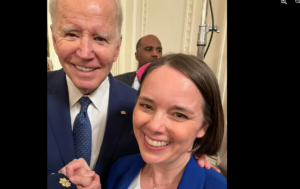Proposals in Maine House Speaker’s Plan Already Solved by Law that Senator Susan Collins Helped Write.
Augusta, ME – Too little too late for Maine House Speaker Sara Gideon who, this week, released her plan to combat the coronavirus. Gideon waited until after the U.S. Senate has already voted on a third stimulus package to deal with the epidemic to release her plan – and, even more stunning, nearly every point Gideon’s raised in her plan had already been addressed.
Shockingly, Gideon’s “plan” completely ignores the major economic issues being caused by the outbreak of COVID-19 and it offers zero assistance to Maine’s small businesses.
“At a time when the people of Maine need real leadership, they see it in Senator Susan Collins. Senator Collins has worked relentlessly over the past several weeks to help ensure Maine’s small businesses and everyone who works there receives desperately needed assistance as Congress addresses the coronavirus crisis,” said Maine GOP Chair Dr. Demi Kouzounas. “Speaker Gideon, on the other hand, waited until after the Senate had passed a third stimulus bill to even present a plan – and even then, nearly every single issue she raised had already been fixed. It was simply too little, too late. This is yet another example of how Sara Gideon is not ready for primetime.”
Gideon’s plan, “What the Federal Government Must Do to Address COVID-19,” was released on March 26, 2020.
The U.S. Senate approved its third stimulus plan on March 25, 2020 – THE DAY BEFORE GIDEON EVEN RELEASED A PLAN.
Here are the details of Gideon’s plan and the facts.
- Ensure COVID-19 testing is available for every American who needs a test and immediately expand the number and kinds of labs that are able to process the tests.
FACT: The “Coronavirus Aid, Relief, and Economic Security Act,” or CARES Act, that Senator Collins helped negotiate, includes $127 billion in the Public Health and Social Services Emergency Fund. Senator Collins personally intervened to ensure that NorDx received the critical supplies it needed to restore its testing capacity.
- The Trump Administration should also dispatch the Department of Defense to set up field hospitals for trauma patients and run drive-through testing centers, and ensure that hospitals have the critical resources — especially personal protection equipment — by utilizing the powers of the Defense Production Act.
FACT: The CARES Act, that Senator Collins helped negotiate, includes $1 billion for the Defense Production Act to increase access to materials necessary for national security and pandemic recovery.
- Expand access to mobile testing centers and clinics.
FACT: The CARES Act, that Senator Collins helped negotiate, includes $127 billion in the Public Health and Social Services Emergency Fund.
- Fund telehealth options by investing in rural broadband and funding programs that work to connect rural communities with health care providers via telemedicine.
FACT: On March 17th, the Centers for Medicare and Medicaid Services (CMS) significantly expanded telehealth capabilities through regulatory authorities.
In addition, the CARES Act, that Senator Collins helped negotiate,includes:
- $275 million to remain available until Sept. 30, 2022, for the services administered under the Health Resources and Services Administration (HRSA), of which $180 million will need to be used to carry out telehealth and rural health activities. 2022, for the services administered under the Health Resources and Services Administration (HRSA), of which $180 million will need to be used to carry out telehealth and rural health activities.
- Allows Federally Qualified Health Centers and Rural Health Clinics to furnish telehealth services to Medicare beneficiaries in their home or other setting during the COVID-19 emergency.
- $25 million to the USDA’s Rural Development Grant Program for Distance Learning and Telemedicine Program, as well as $100 million to the USDA’s ReConnect program to help ensure rural Americans have access to broadband.
Senators Collins and Doug Jones (D-AL) have also introduced the bipartisan American Broadband Buildout Act of 2019 (ABBA), to ensure that rural Americans have access to broadband services at speeds they need to fully participate in the modern society and economy by directing the Federal Communications Commission (FCC) to provide up to $5 billion in matching grants to help states improve broadband infrastructure.
- Mobilize federal employees who are already living and working in rural parts of our state to help with the coronavirus response.
- Lift the 25-bed limit on “critical access hospitals” in rural areas (like Houlton Regional Hospital and Millinocket Regional Hospital in Maine) to allow them to serve more patients.
FACT: This was done on March 13th by CMS via regulation.
- Increase funding for community health centers. Congress has appropriated additional funds for community health centers, but more support is needed to address the pandemic.
FACT:The CARES Act, that Senator Collins helped negotiate, contains $1.32 billion and the Senate Health Committee, on which Senator Collins serves, passed a 5-year reauthorization just last year.
- Further expand paid family and medical leave for workers whose children are out of school or daycare, who are sick, or who are caring for a sick person.
FACT: On March 19th, with Senator Collins’ support – the Senate passed the second stimulus, The Families First Coronavirus Response Act. As a result, certain employers can now provide paid sick and family leave for the first time. The U. S. Department of Labor has already published guidance explain paid sick leave and expanded family and medical leave. https://www.dol.gov/newsroom/releases/whd/whd20200324
- Expand SNAP and increase funding for school meal programs to enable them to fully serve their students and families while schools are closed.
FACT: The Families First Coronavirus Response Act also included:
• Pandemic-SNAP (P-SNAP) Policy. Grants USDA the authority for states to provide SNAP benefits to households with children who attend a school that closes for more than five days and who would otherwise receive free or reduced-price meals. This can be in the form of additional EBT benefits.
• Waived Able-Bodied Adult Without Dependents (ABAWD) time limit (and subsequent work requirement). This means that ABAWDs will be permitted to receive SNAP for longer than three months in a 36-month period even when not fulfilling a 20 hour-per-week work or work readiness requirement.
• Additional SNAP Flexibilities in a Public Health Emergency. Gives USDA the authority to (1) provide the maximum monthly allotment to households when States provide sufficient reasoning to do so and (2) provide additional administrative flexibilities (e.g. reduced reporting, reduced face-to-face interviews, etc.)
• WIC. Increases funding for the Special Supplemental Nutrition Program for Women, Infants, and Children (WIC) by $500 million.
• Child Nutrition. Provides authority to waive requirements that limit program operators’ ability to get these meals to the children who need them and permits the Secretary to waive provisions in the school meal programs even if it would result in an additional cost to the federal government.
In addition, the CARES Act, that Senator Collins helped negotiate:
• Provides nearly $16 billion for to cover the estimated increase in participation and new flexibility.
• Provides nearly $9 billion for Child Nutrition Programs, and both the second and third stimulus packages provide significant funding to support food banks and other local organizations that fill gaps between child nutrition programs and SNAP.
Again, Gideon’s plan DOES NOTHING to provide economic assistance to small businesses, such as restaurants, bars, hotels, breweries, cosmetologists, or self-employed individuals. However, on March 17th, Senator Collins released her own plan to preserve Maine jobs and protect small businesses – which became law when President Trump signed the relief bill on Friday and will provide much-needed relief Maine’s small businesses and our workers.



